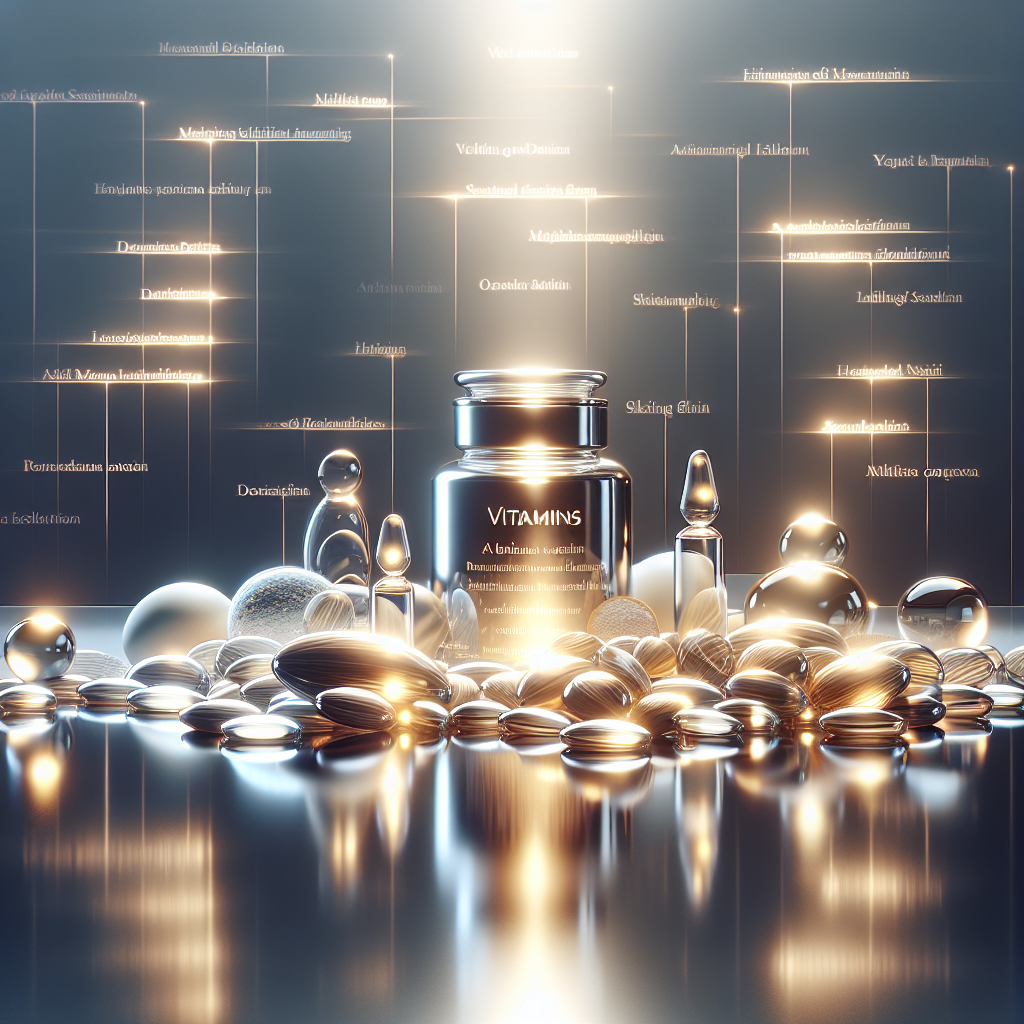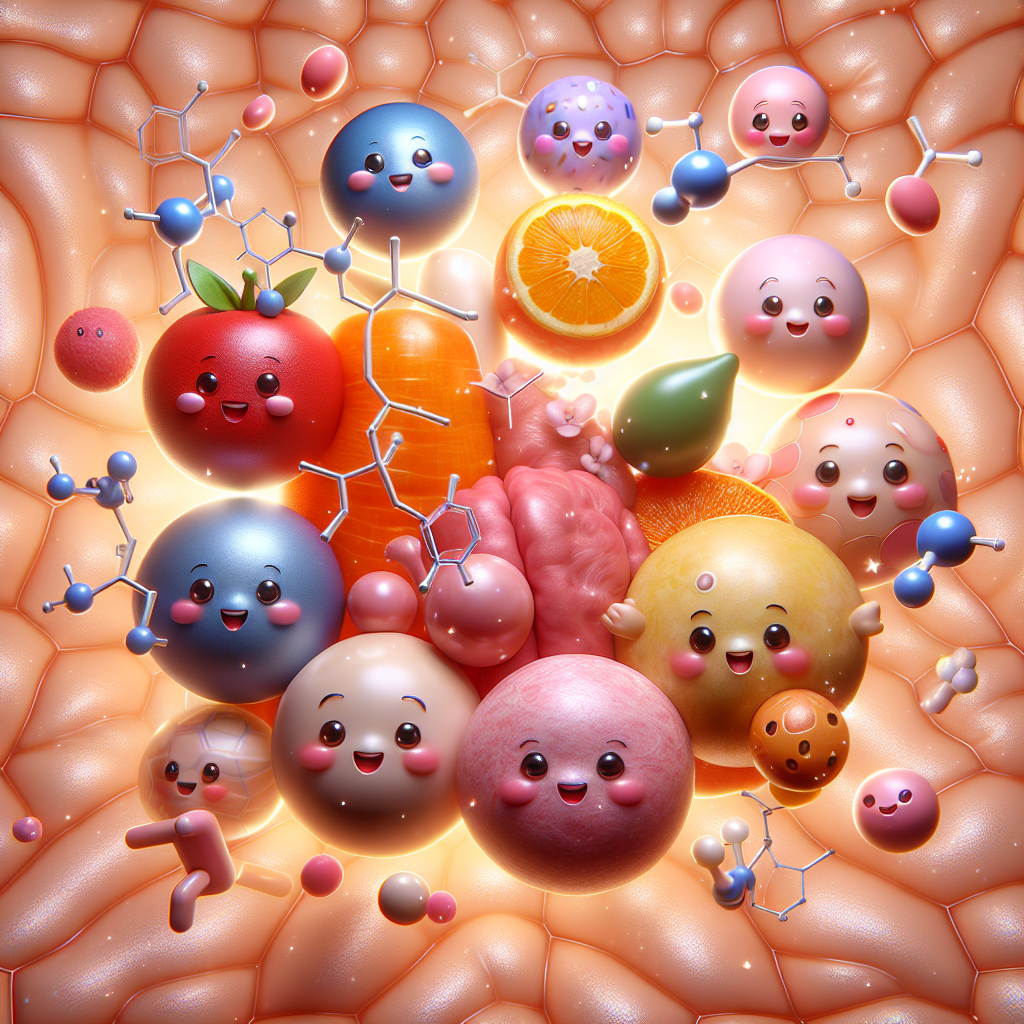Vitamins That Keep Skin Looking Youthful

Discover the secret to youthful-looking skin with our range of vitamins. Don’t wait, rejuvenate your skin today! Click here to explore our products.
Essential Vitamins for Maintaining Youthful Skin
The quest for youthful, radiant skin is a universal pursuit that transcends age, gender, and culture. While many turn to expensive creams, serums, and even surgical procedures to maintain a youthful appearance, the secret to healthy, glowing skin may lie in something much simpler: vitamins. Indeed, certain vitamins play a crucial role in skin health, contributing to its elasticity, glow, and overall youthfulness.
Vitamin A, for instance, is a potent antioxidant that fights against the damaging effects of free radicals, which are unstable molecules that can cause premature aging. It also promotes the production of healthy skin cells, helping to keep the skin firm and smooth. Retinol, a derivative of vitamin A, is a common ingredient in many anti-aging skincare products due to its ability to stimulate collagen production and reduce the appearance of fine lines and wrinkles.
Vitamin C, another powerful antioxidant, is essential for the synthesis of collagen, a protein that gives the skin its structure and elasticity. It also helps to brighten the skin and fade dark spots, resulting in a more even complexion. Moreover, vitamin C protects the skin from the harmful effects of ultraviolet (UV) radiation, which can lead to skin aging and cancer.
Vitamin E, often hailed as the ‘skin vitamin’, is a fat-soluble nutrient that has strong antioxidant properties. It helps to protect the skin from environmental damage caused by free radicals and UV radiation. Additionally, vitamin E works to keep the skin hydrated by strengthening the skin’s barrier function, which helps to lock in moisture and prevent dryness and flaking.
Vitamin B3, also known as niacinamide, is another essential nutrient for skin health. It helps to improve the skin’s texture and tone by boosting the production of ceramides, which are lipids that help to maintain the skin’s protective barrier. This results in smoother, more hydrated skin. Niacinamide also has anti-inflammatory properties, making it beneficial for those with acne-prone or sensitive skin.
Lastly, vitamin K is known for its ability to improve the appearance of skin discolorations, such as dark circles under the eyes and bruising. It does this by aiding in the body’s blood clotting process, which can help to reduce the appearance of these skin issues.
Incorporating these vitamins into your skincare routine can significantly improve the health and appearance of your skin. However, it’s important to remember that topical application is just one piece of the puzzle. A balanced diet rich in fruits, vegetables, lean proteins, and healthy fats will provide your body with the nutrients it needs to maintain healthy skin from the inside out.
Moreover, while vitamins are essential for skin health, they are not a cure-all. Other factors, such as adequate hydration, regular exercise, sufficient sleep, and protection from the sun, also play a crucial role in maintaining youthful skin.
In conclusion, vitamins A, C, E, B3, and K are essential for maintaining youthful, radiant skin. By incorporating these vitamins into your skincare routine and diet, you can help to protect your skin from damage, improve its texture and tone, and maintain its overall health and youthfulness. However, remember that a holistic approach to skincare, which includes a balanced diet and a healthy lifestyle, is the key to achieving and maintaining beautiful skin.
The Role of Vitamins in Skin Anti-Aging

The quest for youthful, radiant skin is a universal pursuit that transcends age, gender, and culture. While many turn to expensive creams, serums, and even surgical procedures to maintain a youthful appearance, the role of vitamins in skin anti-aging is often overlooked. Vitamins, both consumed through diet and applied topically, can play a significant role in preserving the skin’s youthful glow and delaying the onset of aging signs.
Vitamin A, also known as retinol, is one of the most potent anti-aging vitamins. It stimulates the production of new skin cells and encourages the growth of collagen, a protein that maintains the skin’s elasticity and firmness. By promoting cell turnover and collagen synthesis, vitamin A helps to reduce the appearance of fine lines, wrinkles, and age spots, giving the skin a smoother, more youthful appearance. Foods rich in vitamin A include sweet potatoes, carrots, and dark leafy greens, while retinol-based creams and serums can be applied topically for more targeted treatment.
Vitamin C, a powerful antioxidant, is another essential vitamin for skin anti-aging. It neutralizes harmful free radicals that can damage the skin cells and accelerate the aging process. Moreover, vitamin C plays a crucial role in collagen synthesis, helping to maintain the skin’s firmness and elasticity. It also brightens the skin and fades dark spots, contributing to a more even and youthful complexion. Citrus fruits, strawberries, and bell peppers are excellent sources of vitamin C, and it can also be found in a variety of skincare products, from serums to moisturizers.
Vitamin E, like vitamin C, is a potent antioxidant that protects the skin from oxidative stress caused by environmental factors such as UV radiation and pollution. It also has anti-inflammatory properties that can soothe and calm the skin, reducing redness and irritation. Vitamin E can be found in nuts, seeds, and vegetable oils, and is a common ingredient in many skincare products, particularly those designed for dry or sensitive skin.
Vitamin B3, or niacinamide, is another key player in skin anti-aging. It improves the skin’s barrier function, helping to lock in moisture and keep out irritants. This results in plumper, more hydrated skin, which can reduce the appearance of fine lines and wrinkles. Niacinamide also regulates oil production, which can help prevent breakouts and give the skin a smoother, more refined texture. Foods like chicken, tuna, and mushrooms are rich in vitamin B3, and it can also be found in a range of skincare products, from cleansers to night creams.
In conclusion, vitamins play a vital role in skin anti-aging, helping to maintain the skin’s health and youthful appearance from the inside out. By incorporating foods rich in these vitamins into your diet and using skincare products that contain them, you can support your skin’s natural anti-aging processes and keep it looking youthful for longer. However, it’s important to remember that while vitamins can help delay the signs of aging, they can’t reverse them entirely. A holistic approach to skin anti-aging, including a balanced diet, regular exercise, adequate sleep, and good skincare habits, is the most effective way to maintain youthful, radiant skin.
Top Vitamins to Incorporate for a Youthful Skin Glow
The quest for youthful, glowing skin is a universal pursuit that transcends age, gender, and culture. While many turn to expensive creams, serums, and other topical treatments, the secret to maintaining a youthful glow may lie in something far simpler and more accessible: vitamins. Indeed, certain vitamins are known to have potent skin-rejuvenating properties that can help to keep your skin looking youthful and vibrant.
Firstly, let’s consider Vitamin A. This vitamin is a powerhouse when it comes to maintaining skin health. It promotes cell turnover, which is the process by which the skin sheds old, dead cells and replaces them with new ones. This process is crucial for keeping the skin looking fresh and youthful. Vitamin A also has potent anti-aging properties. It can help to reduce the appearance of fine lines and wrinkles, and it can also help to improve skin tone and texture. Foods rich in Vitamin A include sweet potatoes, carrots, and spinach.
Next, we have Vitamin C. This vitamin is a potent antioxidant that can help to protect the skin from the damaging effects of free radicals. Free radicals are unstable molecules that can cause damage to the skin’s cells, leading to premature aging. By neutralizing these harmful molecules, Vitamin C can help to prevent this damage and keep the skin looking youthful. Additionally, Vitamin C plays a crucial role in the production of collagen, a protein that gives the skin its firmness and elasticity. Foods rich in Vitamin C include citrus fruits, strawberries, and bell peppers.
Vitamin E is another essential vitamin for skin health. Like Vitamin C, Vitamin E is a powerful antioxidant that can help to protect the skin from free radical damage. It also has moisturizing properties that can help to keep the skin hydrated, which is crucial for maintaining a youthful glow. Foods rich in Vitamin E include nuts, seeds, and spinach.
Lastly, we have Vitamin K. This vitamin is often overlooked when it comes to skin health, but it plays a crucial role in the body’s ability to heal wounds and bruises. By promoting the body’s healing process, Vitamin K can help to keep the skin looking healthy and youthful. Foods rich in Vitamin K include leafy green vegetables, broccoli, and Brussels sprouts.
In conclusion, vitamins play a crucial role in maintaining skin health and keeping it looking youthful. By incorporating foods rich in Vitamins A, C, E, and K into your diet, you can help to nourish your skin from the inside out and maintain a youthful glow. However, it’s important to remember that while vitamins can help to improve skin health, they are not a substitute for a healthy lifestyle. Regular exercise, adequate sleep, and a balanced diet are all crucial for maintaining healthy, youthful skin. Additionally, it’s important to protect your skin from the sun by wearing sunscreen and avoiding excessive sun exposure. By combining these lifestyle habits with a diet rich in skin-healthy vitamins, you can help to keep your skin looking youthful and vibrant for years to come.